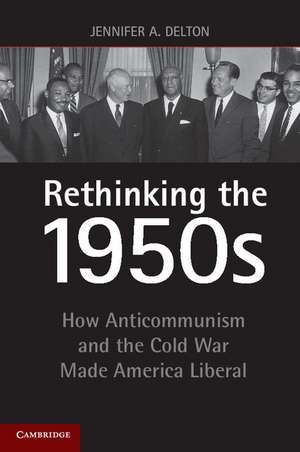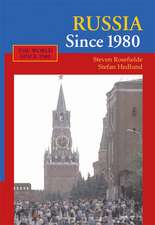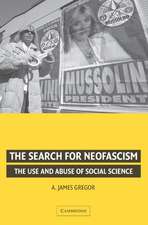Rethinking the 1950s: How Anticommunism and the Cold War Made America Liberal
Autor Jennifer A. Deltonen Limba Engleză Paperback – 6 oct 2013
| Toate formatele și edițiile | Preț | Express |
|---|---|---|
| Paperback (1) | 178.42 lei 6-8 săpt. | |
| Cambridge University Press – 6 oct 2013 | 178.42 lei 6-8 săpt. | |
| Hardback (1) | 631.09 lei 6-8 săpt. | |
| Cambridge University Press – 6 oct 2013 | 631.09 lei 6-8 săpt. |
Preț: 178.42 lei
Nou
Puncte Express: 268
Preț estimativ în valută:
34.14€ • 35.60$ • 28.38£
34.14€ • 35.60$ • 28.38£
Carte tipărită la comandă
Livrare economică 20 martie-03 aprilie
Preluare comenzi: 021 569.72.76
Specificații
ISBN-13: 9781107620575
ISBN-10: 1107620570
Pagini: 203
Dimensiuni: 152 x 228 x 14 mm
Greutate: 0.36 kg
Ediția:New.
Editura: Cambridge University Press
Colecția Cambridge University Press
Locul publicării:New York, United States
ISBN-10: 1107620570
Pagini: 203
Dimensiuni: 152 x 228 x 14 mm
Greutate: 0.36 kg
Ediția:New.
Editura: Cambridge University Press
Colecția Cambridge University Press
Locul publicării:New York, United States
Cuprins
Introduction: the liberal fifties; 1. Anticommunist liberals; 2. Moderate Republicans; 3. Corporate liberals; 4. Conservatives; 5. Civil rights; 6. Eisenhower's liberal legacy.
Recenzii
'With this genuinely original, important, and provocative book, Jennifer Delton takes on the prevailing wisdom about the eclipse of the New Deal, the decline of liberalism, and the role of conservatism in the postwar era. The conservative 1950s were less conservative than we think, and liberalism proved more of a driving force than the dominant narratives would have us believe. Where many scholars hold the Cold War and anticommunism responsible for the smothering of dissent, she finds in both a critical rationale for domestic social reform. In challenging the consensus view on a variety of fronts, Delton forces us to think very differently about the postwar era.' Eric Arnesen, George Washington University
'Jennifer Delton has crafted an important book that should change the way we think about the politics of postwar America. Far from being a period of conservative ascendance, as recent scholarship suggests, the 1950s was a period in which numerous interest groups - anticommunist liberals, moderate Republicans, corporate executives, and the executive branch - agreed that the federal government should employ its powers to promote civil rights, economic growth and welfare programs at home, and national interests abroad. Reflecting the solid analyses and effective writing style of a mature historian, Rethinking the 1950s is accessible to the general reader.' William R. Childs, Professor of History, Emeritus, The Ohio State University
'We need this book! Jennifer A. Delton's fresh evidence and powerful insights let us see the 1950s through pre-1980 eyes to remember what 'modern liberals' (the majority of Americans then) really believed and achieved in the 1950s. A strong liberal consensus made it possible to improve citizens' lives and expand their freedoms, building the nation while competing with communism. Masterfully researched and argued, Rethinking the 1950s makes it possible to do that rethinking.' Pamela Laird, University of Colorado Denver
'Jennifer Delton advances a bold new interpretation of postwar American politics. She pushes back against historians skeptical of the achievements of the New Deal or convinced that American politics has been dominated by conservative rather than liberal ideas. As she shows, even pro-market Republicans supported the liberal vision of the good society in the 1950s because there was an alternative to capitalism abroad during the Cold War. In fighting the menace of communism, they advanced the American welfare state and accommodated themselves to the call for civil rights. She has a message that those interested in American politics both past and present should hear.' Kenneth Lipartito, Florida International University, and co-author of Corporate Responsibility: The American Experience
'Jennifer Delton has crafted an important book that should change the way we think about the politics of postwar America. Far from being a period of conservative ascendance, as recent scholarship suggests, the 1950s was a period in which numerous interest groups - anticommunist liberals, moderate Republicans, corporate executives, and the executive branch - agreed that the federal government should employ its powers to promote civil rights, economic growth and welfare programs at home, and national interests abroad. Reflecting the solid analyses and effective writing style of a mature historian, Rethinking the 1950s is accessible to the general reader.' William R. Childs, Professor of History, Emeritus, The Ohio State University
'We need this book! Jennifer A. Delton's fresh evidence and powerful insights let us see the 1950s through pre-1980 eyes to remember what 'modern liberals' (the majority of Americans then) really believed and achieved in the 1950s. A strong liberal consensus made it possible to improve citizens' lives and expand their freedoms, building the nation while competing with communism. Masterfully researched and argued, Rethinking the 1950s makes it possible to do that rethinking.' Pamela Laird, University of Colorado Denver
'Jennifer Delton advances a bold new interpretation of postwar American politics. She pushes back against historians skeptical of the achievements of the New Deal or convinced that American politics has been dominated by conservative rather than liberal ideas. As she shows, even pro-market Republicans supported the liberal vision of the good society in the 1950s because there was an alternative to capitalism abroad during the Cold War. In fighting the menace of communism, they advanced the American welfare state and accommodated themselves to the call for civil rights. She has a message that those interested in American politics both past and present should hear.' Kenneth Lipartito, Florida International University, and co-author of Corporate Responsibility: The American Experience
Notă biografică
Descriere
This book argues that far from subverting the New Deal state, anticommunism and the Cold War enabled, fulfilled, and even surpassed the New Deal's reform agenda.












